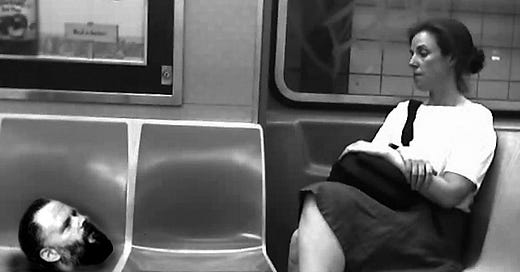“I am Ubik. Before the universe was, I am. I made the suns. I made the worlds. I created the lives and the places they inhabit; I move them here, I put them there. They go as I say, then do as I tell them. I am the word and my name is never spoken, the name which no one knows. I am called Ubik, but that is not my name. I am. I shall always be.”
“Instant Ubik has all the fresh flavor of just-brewed drip coffee. Your husband will say, Christ, Sally, I used to think your coffee was only so-so. But now, wow! Safe when taken as directed.”
Philip K Dick’s novel, Ubik, was published in 1969. As with other of PKD’s visions of the future, reality eventually bends towards the fiction.
Accelerationism, Transhumanism, Baudrillardian Similcram are all there - as conepts made flesh. As in Baudrillard, reality is made to reappear in photographic images of nature, pornography, fashion, war, terrorism, even philosophy as simulation. It doesn’t matter that the technological mediations have turned out in ways other than how Dick imagined..
In Dick’s vision of America in 1992, the ruling class, instead of dying, preserve their ’selves’ by living a ‘half-life’ in a ‘cold-pac’casket kept in a Swiss Moratorium. Here. they are visited by colleagues and relatives for ‘half-life’ communications so, in effect, they can run their companies from beyond-the-grave.
In Dick’s Manichean-Gnostic universe, there are forces of dialectical opposites which are supposed to balance each other (the psychics and the counter-psychics), but the balance is undermined because within the world of the ‘cold-pacs’ there are destructive souls who destroy and feed off the others. One the destroyers, named ‘Jory’, organises the terrorist murder of the Runciter Corporations’ anti-psys on the Luna station, then constructs this strange world of decay into which the victims are cast, i.e. Des Moines in 1939 in which commodities (every object in the hotel, from the lift to the furniture) are regressed into previous Platonic forms. The hero, Joe Chip, who hasn’t yet worked out that he now is a half-lifer in a a casket in Switzerland (having been killed in the bombing) realises that Jory can only destroy because (like Capital) he can’t grasp the fact that he doesn’t have clue what Ubik is, i.e. he can’t understand the nature of the commodity as a fetish: a struggle between living and dead labour; he can only produce more of the same, without any reason for doing so apart from the compulsion to grow via destruction (capital accumulation):
(Joe to Jory) “Perhaps your definition of your self-system lacks authentic boundaries. You've erected a precarious structure of personality on unconscious factors over which you have no control. That's why you feel threatened by me.”
The ‘angel’ of the story, Runciter’s wife Ella, intervenes from her cold-pac to help Joe beat Jory. She (yet another manifestation of Dick’s lost twin sister) is more Tibetan Book of the Dead that Transhumanist; she is waiting for the light of natural death and rebirth.
At times Joe sounds like revolutionary:
“From the drawer beside the sink Joe Chip got a stainless steel knife; with it he began systematically to unscrew the bolt assembly of his apt's money-gulping door.
"I'll sue you," the door said as the first screw fell out. Joe Chip said, "I've never been sued by a door. But I guess I can live through it.”“One of these days," Joe said wrathfully, "people like me will rise up and overthrow you, and the end of tyranny by the homeostatic machine will have arrived. The day of human values and compassion and simple warmth will return, and when that happens someone like myself who has gone through an ordeal and who genuinely needs hot coffee to pick him up and keep him functioning when he has to function will get the hot coffee whether he happens to have a postcred readily available or not.”
George Romero’s Zombie trilogy complements Dick’s radical humanism. Unlike Dick’s world, in which undead, half-life is the preserve of the ruling class, in Romero the Zombiefication of the dead is strictly democratic; there are no class distinctions. But the democracy has been completely commodified, with the undead who infest the a shopping mall still imagining that commodites provide their dead lives with meaning.




